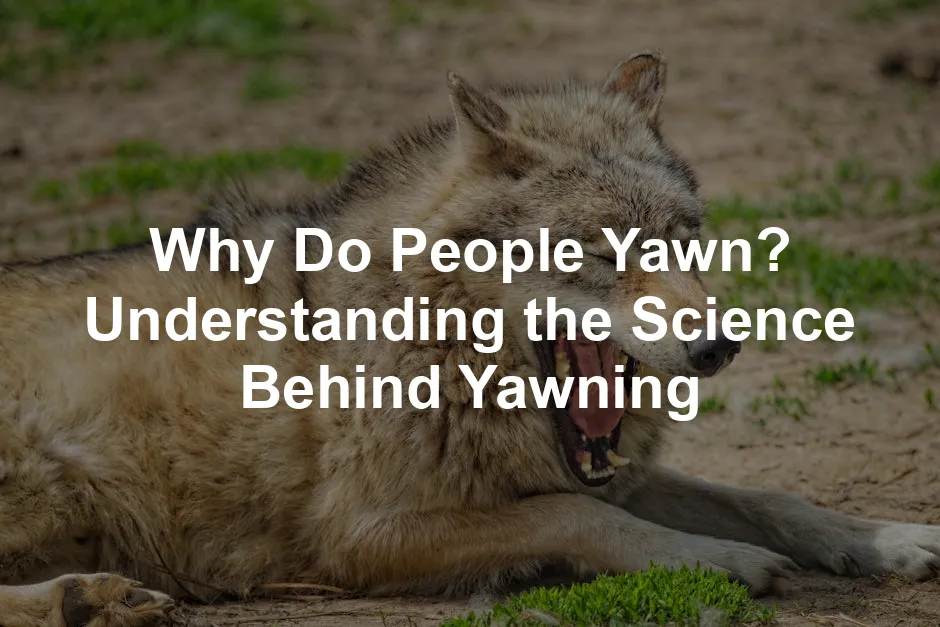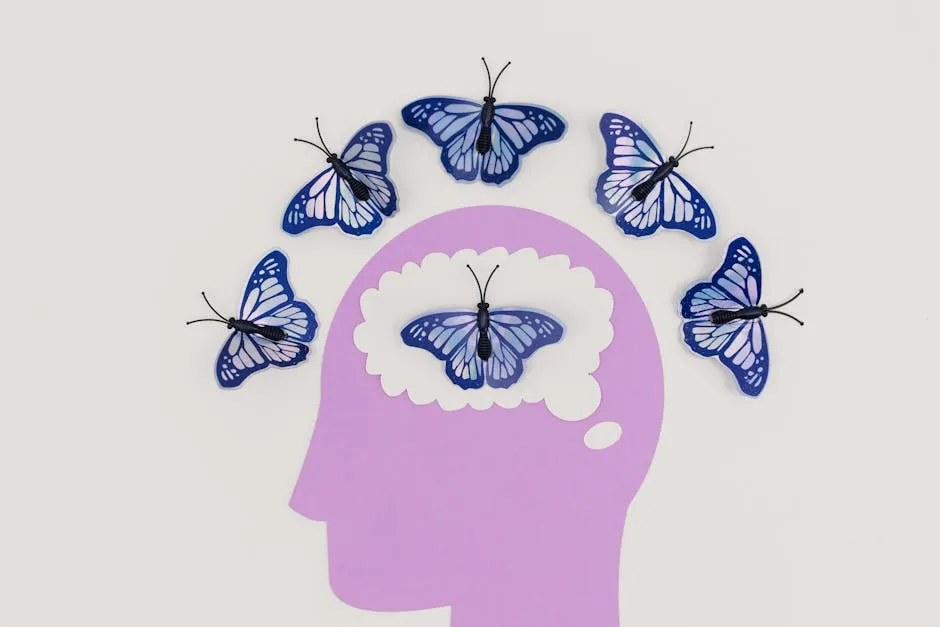
Why Do People Yawn? Understanding the Science Behind Yawning
Introduction
Yawning is a universal behavior, seen in both humans and animals. It’s something we all do, often without thinking. But why do we yawn? There are several theories that attempt to explain this intriguing phenomenon. In this article, we’ll explore the various reasons behind yawning and what it might reveal about our bodies and minds. If you’re curious about the science behind this behavior, check out Yawning: A Natural History of a Universal Behavior, a book that dives deeper into this fascinating subject.Summary and Overview
Yawning is primarily an involuntary reflex. It typically lasts between four to seven seconds. Most often, we associate yawning with tiredness or boredom. However, it can also be a response to stress or a transition in alertness. This article will cover the nature of yawning, its triggers, types, and the science behind why we yawn. If you’re looking to improve your sleep, you might want to consider Sleep Smarter: 21 Essential Strategies to Sleep Your Way to a Better Body.
The Nature of Yawning
What is Yawning?
Yawning is an automatic process where we open our jaw wide and take a deep breath. This is followed by a quick exhale. During a yawn, our body stretches and relaxes, which can be quite satisfying. Common triggers for yawning include fatigue, boredom, and even watching someone else yawn. On average, humans yawn about six to 23 times a day, and this frequency often depends on individual circumstances and environments. If you’re interested in the psychology behind yawning, check out The Psychology of Yawning: Understanding the Reflex.Types of Yawning
There are two main types of yawning: spontaneous and contagious.- Spontaneous yawning occurs without any clear trigger. It’s often associated with transitions, such as waking up or preparing for sleep.
- Contagious yawning, on the other hand, happens when you see, hear, or think about someone else’s yawn. This form of yawning is particularly interesting, as it reflects social connections and empathy.

Theories Behind Yawning
Yawning is a behavior many of us exhibit, often without much thought. Various theories have emerged to explain why this reflex occurs. Let’s explore some of the most prominent ideas. If you want to dive deeper into the science of empathy, check out Empathy: Why It Matters and How to Get It.The Arousal Hypothesis
One popular theory suggests that yawning helps increase alertness and activate the brain. When we yawn, our body undergoes a series of physiological changes. This includes a deep inhalation, which may enhance blood flow to the brain. A study by Guggisberg et al. found that yawning can indeed stimulate brain activity, similar to the effects of caffeine. When we’re bored or tired, yawning becomes more frequent. Our body instinctively attempts to shake off drowsiness. The act of yawning engages facial muscles and increases heart rate, prompting a more alert state. This response can be particularly beneficial during monotonous tasks, like long meetings or lectures. Consider supporting your brain health with Brain Rules: 12 Principles for Surviving and Thriving at Work, Home, and School.
The Cooling Hypothesis
Another intriguing theory posits that yawning helps regulate brain temperature. According to this hypothesis, the act of yawning cools the brain, promoting optimal cognitive function. Research published in Physiology & Behavior indicates that yawning frequency can decrease in cooler environments, supporting this idea. When you yawn, the deep inhalation brings cooler air into the body. This air may help dissipate heat around the brain. Additionally, increased blood flow to the face and neck during yawning could facilitate heat dissipation. Hence, yawning might serve as a natural mechanism to maintain an ideal brain temperature. If you’re interested in understanding more about animal behavior, consider Animal Behavior: An Evolutionary Approach.
The Communication Hypothesis
Yawning may also serve as a form of social communication. This idea suggests that yawning expresses feelings of tiredness, boredom, or mild stress to those around us. The contagious nature of yawning highlights its possible role in social bonding. Research has shown that empathy plays a significant role in contagious yawning. We are more likely to yawn in response to someone we know well. A study found that individuals with strong emotional connections exhibited higher rates of contagious yawning. This suggests that yawning can strengthen social ties and foster understanding among individuals. For more insight into the importance of empathy, you might enjoy The Empathy Effect: How Compassionate People Are Changing the World.
Other Theories
Beyond the main hypotheses, several other theories about yawning exist. One less common view suggests yawning may function as a respiratory mechanism. The act of yawning stretches lung tissues, promoting better lung function. This theory implies that yawning could help maintain lung health. Additionally, some researchers consider yawning a protective reflex. It may help redistribute a substance called surfactant, which keeps the lungs lubricated. This function could be vital in ensuring that our lungs operate effectively. From an evolutionary perspective, yawning could have assisted our ancestors in staying alert in group settings. The collective nature of yawning may enhance group vigilance and communication, benefiting social animals. If you’re curious about how animals communicate, consider Animal Communication: A Practical Guide.
Contagious Yawning
Understanding Contagious Yawning
Have you ever yawned after seeing someone else do the same? This phenomenon is known as contagious yawning. It’s not just a human behavior; many animals experience it too. Researchers have found that observing or hearing another yawn can trigger a similar response. Contagious yawning varies among species, but it’s particularly prevalent among social animals. Studies show that chimpanzees yawn in response to their peers, suggesting a deep social connection. This behavior appears to be linked to empathy. When we see others yawn, our brain may instinctively mirror their actions, promoting social bonding. The psychological aspects of contagious yawning are fascinating. It’s believed that individuals with higher empathy levels are more likely to yawn in response to others. This connection highlights the role of nonverbal communication in human and animal interactions. If you’re interested in stories that explore empathy in animals, check out How Animals Grieve.
The Role of Empathy
Have you ever noticed how a yawn can spread like wildfire in a room? This phenomenon is known as contagious yawning, and it’s closely tied to our ability to empathize. Studies suggest that when we see someone yawn, our brain reacts in a similar way. This may be our natural instinct to connect with others. Research has shown that people are more likely to yawn in response to someone they feel close to. For instance, you might find yourself yawning when a friend or family member does it. This empathetic response highlights the social bonds we share. It’s fascinating how something as simple as a yawn can reveal our emotional connections. To explore more about the connection between empathy and happiness, consider The Art of Happiness.
Observations in Other Species
Yawning isn’t just a human behavior; it occurs in many animals, too! For example, chimpanzees and dogs are known to exhibit contagious yawning. When a chimp sees another yawn, it often responds in kind. Similarly, dogs can catch yawns from their owners, showing their strong social bonds. These observations suggest that yawning serves a significant role in social behavior across species. In social animals, contagious yawning may promote group cohesion and communication. The ability to yawn in response to others may help synchronize moods and alertness within a group. Interestingly, research indicates that animals with larger brains, like dolphins and elephants, tend to yawn longer. This correlation hints at the idea that yawning might help regulate brain function. Understanding yawning in animals can shed light on social dynamics, empathy, and communication in the animal kingdom. For those who enjoy coloring as a relaxing activity, consider Wild Animals of North America: A Coloring Book.
Excessive Yawning: When to Be Concerned
What Constitutes Excessive Yawning?
Excessive yawning is generally defined as yawning more than three times in a 15-minute period without a clear reason. While yawning is a common reflex, frequent yawning may indicate underlying issues. Common causes of excessive yawning include sleep disorders, such as sleep apnea or narcolepsy, as well as anxiety and stress. Additionally, certain medications, like SSRIs, might trigger increased yawning. Some neurological conditions, such as migraines or multiple sclerosis, can also lead to this behavior. If yawning starts to interfere with your daily life, it’s worth paying attention to. If you’re looking for natural sleep support, consider Sleep Aid Supplements.
When to Consult a Doctor
If you find yourself yawning excessively, it may be time to consult a doctor. Especially if your yawning is accompanied by other concerning symptoms, such as shortness of breath, fatigue, or dizziness. These could indicate more serious health issues, such as heart conditions or neurological problems. Keep an eye on when and why you are yawning excessively. If it disrupts your daily activities or quality of life, don’t hesitate to seek medical advice. Early intervention can help identify any underlying health concerns and provide appropriate treatment options. Remember, your health is paramount, and understanding your body is a key step toward wellness. For a cozy experience while resting, consider investing in a Weighted Blanket.
Conclusion
Yawning is a fascinating behavior that serves multiple purposes. We’ve explored its involuntary nature, its triggers, and the various theories behind it. Yawning can indicate tiredness, boredom, or even stress. It’s not just a physiological response; it also plays a social role in our interactions. The contagious aspect of yawning highlights our ability to empathize with others. So next time you catch yourself yawning, consider its significance. Pay attention to your own yawning patterns and what they might reveal about your state of mind or emotional connections. If you’re looking to track your sleep patterns, a Sleep Tracker might be a great tool for you.
Understanding how environmental factors can influence sleep disorders like bruxism can provide insights into why yawning might occur more frequently under certain conditions. why do environmental factors influence sleep disorders like bruxism
FAQs
Why do I yawn when I see someone else yawn?
Yawning can be contagious! This phenomenon is closely linked to empathy. When you see someone yawn, your brain may instinctively mirror their actions. Studies show that individuals with strong emotional connections are more likely to yawn in response to others. So, if you find yourself yawning after someone else, it might be your brain’s way of connecting with them.
Is yawning a sign of tiredness or boredom?
While yawning is often associated with tiredness or boredom, it’s not that simple. Many people mistakenly believe that yawning increases oxygen intake, but research challenges this idea. Yawning can also occur due to stress, transitions in alertness, or even seeing someone else yawn. It’s a complex behavior with multiple triggers, not just linked to fatigue.
Can excessive yawning indicate a health problem?
Yes, excessive yawning can sometimes signal underlying health issues. While yawning is common, doing it excessively—like more than three times in 15 minutes—might require attention. Conditions such as sleep disorders, anxiety, or neurological issues can cause frequent yawning. If you’re yawning excessively and notice other symptoms like fatigue or shortness of breath, consider consulting a healthcare professional.
How many times does a person yawn in a day on average?
On average, adults yawn between six and twenty times daily. This range can vary based on individual factors and circumstances. For instance, when feeling tired or bored, you might yawn more frequently. Interestingly, studies show that the frequency of yawning tends to decrease with age. Infants can yawn as many as 25 times a day, but this number declines as they grow older.
What are some techniques to reduce excessive yawning?
If you find yourself yawning excessively, especially in social or professional settings, here are some practical tips to help manage it: 1. **Stay Engaged**: Keep your mind stimulated. Participating in conversations or activities can help reduce boredom. 2. **Practice Deep Breathing**: Taking deep breaths can invigorate you and may lessen the urge to yawn. 3. **Take Breaks**: If you’re in a meeting or a long class, step outside for a quick walk. Fresh air can boost your alertness. 4. **Stay Hydrated**: Dehydration can lead to fatigue, which may trigger more yawning. Drink enough water throughout the day. 5. **Get Enough Sleep**: Ensure you’re well-rested. Sleep deprivation is a common cause of excessive yawning.
Is it true that yawning helps increase oxygen intake?
For many years, people believed that yawning increased oxygen levels in the blood. However, recent research challenges this notion. Studies indicate that yawning does not significantly alter oxygen or carbon dioxide levels in the body. Instead, yawning may serve other functions, such as cooling the brain or signaling a change in alertness. So, while it feels refreshing, yawning might not be the solution to a lack of oxygen.
Why do my eyes water when I yawn?
When you yawn, several physiological processes occur that can lead to watery eyes. Yawning involves the stretching of facial muscles, including those around your eyes. This action can stimulate the lacrimal glands, which produce tears. Additionally, the deep inhalation during a yawn may cause increased pressure in the eyes, leading to tear production. This is completely normal and often happens when you’re feeling tired or after a long day.
All images from Pexels




